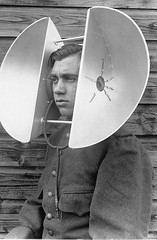 We were all probably taught the difference between listening and hearing when we were children. “I hear you,” you say. No doubt you’ve uttered that or had it uttered to you. But is it enough?
We were all probably taught the difference between listening and hearing when we were children. “I hear you,” you say. No doubt you’ve uttered that or had it uttered to you. But is it enough?
We all have a fundamental need to be heard; that implies that we’re acknowledged, certainly. Technically, hearing is simply the process of sound being transmitted and received. Telling someone that you’ve heard them is a good first step, and while that’s an easy way to make a customer feel appreciated by a major brand, there are times when it needs to go beyond hearing and to truly listen: to take to heart what they’ve said and take a harder look at a business practice or service.
It’s a cinch
Case in point: Cinch.
 This service launched in 2009 and is basically an audio blogging platform. Think of it as a Twitter for podcasting. It allows people to record and upload thoughts via a voice platform and then to share online. It’s a great service and admittedly one that I haven’t utilized enough. Yet.
This service launched in 2009 and is basically an audio blogging platform. Think of it as a Twitter for podcasting. It allows people to record and upload thoughts via a voice platform and then to share online. It’s a great service and admittedly one that I haven’t utilized enough. Yet.
On May 31, Cinch announced to its customers via email that it would be changing the service’s URL from http://www.cinchcast.com to the shorter http://icin.ch. Easier to remember, right? And since they have an iPhone app, iCinch seemed logical.
Evidently not.
Customers didn’t take it that way, at least. And while I didn’t see any violent backlash online, the team at Cinch must have gotten an earful, for on June 1 – the very next day – they issued the following email to their customer base:
Yesterday, when we sent out the message regarding our upcoming website transition from http://cinchcast.com/ to http://icin.ch/, we heard back from several of our community members that they did not like the new domain choice. While it was short, they thought it was hard to remember and share with others, and did not clearly represent the Cinch brand.
Well, we took your feedback to heart. We still need to transition domains on June 7, 2011. However, we have decided to transition the Cinch website to http://cinch.fm instead. Again, other than the URL change this transition will be seamless to our users.
Please let us know if you have any questions. We apologize for any confusion.
Best Regards,
The Cinch Team
What did they do that was so remarkable? First, they let their audience know what they were trying to do, namely simplify the domain name to make it easier for the customer. Second, they acknowledged that they heard their customers’ feedback. Lastly, they took it a step further and made it clear that they listened to their customers and provided a solution that not only met the business need but the customers’ need as well.
As you think about your business and your daily interaction with fans, followers, customers and all kinds of stakeholders, consider how often you hear what it is they’re trying to convey versus how you’re listening to what it is they’re saying. Are you acknowledging them simply for the sake of making them feel good, or are you truly building their daily drumbeat of feedback into your business model?
Last year, Nestle found out the hard way that Greenpeace meant business when the latter staged a Facebook attack on the confectioner. Greenpeace objected to the process of harvesting palm oil for the manufacture of Kit Kats and barraged Nestle with plenty of negative wall posts as well as one horrific, if memorable, video. But in the end, Nestle listened to their detractors and changed their business policy to a “zero deforestation policy” to reflect a more responsible and acceptable practice.
So the next time you’re faced with feedback – from fans or detractors – you should ask yourself, “Are we listening?” The benefits could be tangible.
After all, it’s a cinch.
Scott Monty
Photo credit: x-ray delta one (Flickr)